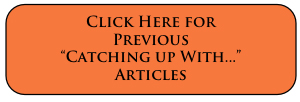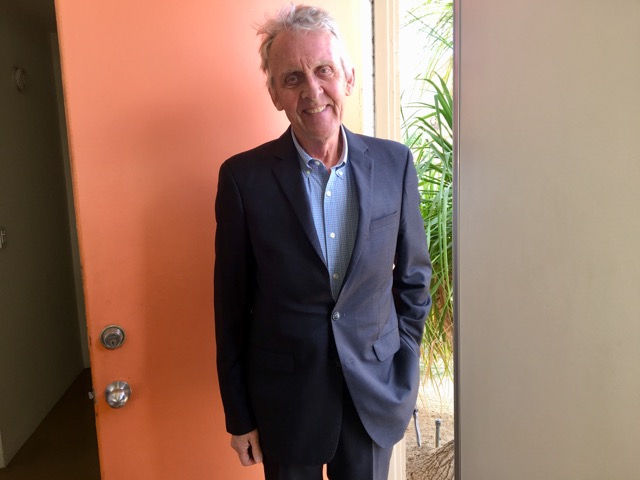Catching Up With . . . Rupert Macnee

The Medium is Only Part of the Message
by Brooke C. Stoddard '69
 Lots of people knew Rupert; he was the classmate with the English first name and the London accent. What they probably didn’t know was that his father was Patrick Macnee, the bowler-topped umbrella-toting crime-fighter male lead of The Avengers television series (also starring in succession Honor Blackman, Diana Rigg and Linda Thorson).
Lots of people knew Rupert; he was the classmate with the English first name and the London accent. What they probably didn’t know was that his father was Patrick Macnee, the bowler-topped umbrella-toting crime-fighter male lead of The Avengers television series (also starring in succession Honor Blackman, Diana Rigg and Linda Thorson).
It was hard to find a place to give birth in England in early 1947. Rupert’s arrival was in Blackheath on the southeast side of London, at Dr. Pink and Dr. White’s, a strictly vegetarian nursing home. His mother, actress Barbara Douglas, promptly became a vegetarian, and raised Rupert as one, though he expanded his diet eventually when school meals became the norm (he has remained largely a vegetarian).
Three years after Rupert, his sister was born, and shortly thereafter his father was offered a television job in Canada. He remained in North America, working in Toronto, Los Angeles and New York for most of the decade.
Rupert and his sister were raised by his mother and her second husband, a professor at the University of Edinburgh. Rupert is just as happy for not growing up in an entertainment-celebrity culture more than he was, but the experience got him used to the drama life and the celebrities it both makes and unmakes -- two good friends are Boris Karloff’s daughter and Lorne Greene’s son.
Aged 13, Rupert was off to Bedford School about 50 miles north of London. Eton was a possibility – Patrick was an alumnus – but Rupert’s mother thought it supercilious. At Bedford, Rupert rowed, but also became interested in drama and in studying history. Owing to his stepfather’s dinner table conversations about academic life in the United States (the Berkeley Free Speech Movement in particular), as well as a visit in 1958 to California, Rupert thought he would give U. S. universities a try. He walked into the U. S. Embassy in London and asked for a list. He applied to Princeton and was accepted into the Class of 1970.
From as early as Freshman Week Rupert was impressed with Princeton and the United States on account of hearing in Alexander Hall Stokely Carmichael profess Black is Beautiful, opening up perspectives on race in America scarcely examined in Britain. Rupert plunged into the study of U. S. Reconstruction and Jim Crow. He switched into the Class of 1969 and entered the Woodrow Wilson School, where course work broadened his perspective on turmoils in Southeast Asia and the Middle East. “It was an amazing time to be in the Woodrow Wilson School,” he recalls. “All of a sudden, those of us in the program felt very grown up. We went to Washington and met Robert Kennedy, Walter Cronkite, and Congressman Gerald Ford. We did amazing things. I can’t imagine any other college being able to do for us what Princeton did.” Rupert wrote his thesis for the Anthropology Department on local versus national issues in Burma. “Doing Princeton in three years was grueling, slogging along in the basement of Firestone Library, and I didn’t manage to do some elective courses I would have liked,” says Rupert.
He did a little rowing at Princeton and some acting, and he enjoyed broadcasting at WPRB. He also worked to win a Ford Foundation grant for establishing a film course at Princeton. A bit off tradition, the film course attracted some who stuck with the medium for careers: Jon Taplin, Tyler Johnson, and Larry Taymor to name a few. It’s through the film course that Rupert first met Jim Floyd, still a close friend. Rupert and Jim made several short 16mm film episodes about town-gown relationships, Jim having grown up in Princeton and his father having been mayor (Jim’s mother's father had been the "Steward" of Tower Club for the Club's first 46 years until his death in 1952). Rupert was often a guest at the Floyds’ Princeton home. “We all bonded over music: there were musical evenings, playing and making recordings, playing gigs, with Oliver Whitehead ’70, Al Price, Boyd Britten '68, Jon Fast '70, Barry Miles, and John Hicks,” Rupert says.
Rupert missed graduation because that was his first day on the job at CTV (a Canadian television network) in Toronto. He started as a researcher on a long-running series called The Untamed World that was syndicated internationally and received an Emmy nomination. He worked in Toronto for several years and took out Canadian citizenship.
He joined the Princeton Club of Canada and Princeton friends from around the world came to visit. In addition, Bill Earle, Terry Williams, and Paul Davids shared a house in the Annex neighborhood of Toronto.
Rupert helped produce 45 half-hour syndicated shows about animals called Friends of Man narrated by Glenn Ford. He linked up with comedian Jonathan Winters to produce 47 half-hour shows that went into syndication; Peter Kaminsky, who was working at National Lampoon magazine at the time, wrote some of the Winters’ scripts while Rupert was producer and sometimes director.
By the early 1980s, Rupert and his wife Heather Stewart, had moved to Los Angeles. Heather worked on and eventually wrote sitcoms. Rupert produced the pilot and two seasons of An Evening at the Improv, 50 one-hour shows of comedy and music for NBC syndication and later A&E.
He also made documentaries on health issues -- some early ones were educational documentaries for heart patients and on health for children. With Casey Kasem, Rupert produced the 1987 American Video Awards.
In 1989, Rupert co-produced, with comedian and writer Tom Parks and Dynasty executive, Ursula Alexander, one of his most successful documentaries, the award-winning Diabetes: A Positive Approach. Employing a humorous day-in-the-life approach, it featured comedians and others from the entertainment world who discussed how they maintained ordinary and productive lives while treating themselves for diabetes. Distributed on cassette tape, it has been shipped by the American Diabetes Association to more than a million persons.
By the 1990s Rupert was line producer of ShowTime’s ACE award-winning Full Frontal Comedy, mainly stand-up comedy for very-late-night television. He wrote and produced “Seven Wonders of the Ancient World” for A&E’s Ancient Mysteries series and line produced a season of World of Wonder for Discovery Channel. He won awards for distance learning programs on economics and on marketing. He wrote and produced “value added” material for Buffy the Vampire Slayer DVDs. Expanding on the health-related work he did about diabetes, he supervised the production of several videos about Kawasaki Syndrome, a mysterious cardiovascular ailment in children. For several years beginning in 2001 he was a broadcast executive for the PBS affiliate KCTS/Seattle, and supervised shows on eating disorders, exploring space, video games, World War II, and early childhood development. In 2008 Rupert was an executive producer on Darwin’s Brave New World, an internationally broadcast drama-documentary mini-series in celebration of the 150th anniversary of the Origin of Species in 2008. Most recently he was Assistant General Manager: Broadcast with NET/Nebraska.
Through all this, Rupert sustained the close friendships he made at Princeton, checking in frequently with Jim Floyd, Peter Bergquist, Bill Hootkins ‘70, Ed Labowitz ’70, and Paul Boorstin ’65 and being active in the Los Angeles Princeton Club.
In 2007 he moved to Rancho Mirage – where his sister settled also – to help care for his father. Rupert calls the small city east of Palm Springs home. He still has video projects. Ongoing is work about the pioneering marine biologist Ed Ricketts, who studied the intertidal and near-shore ocean zones along North America’s Pacific coast.
“I can’t claim to have been a superstar in Hollywood, but I had my moments, notably with An Evening at the Improv, working with lots of very talented professionals, many of whom I still am happy to claim as friends,” Rupert says. “Video went from film to tape to digital, and I went with it. Truth be told, lots of the time goes to editing, which takes place in dark, soundproof rooms working against deadline and someone’s approval to make something that fits minute by minute and hour by hour. In the industry I tried to present myself as a person with a variety of skills – production, writing, directing, post-production and even distribution and marketing. As an independent, I found some of the work exhausting and had to take periods of time off to recover. But there was travel, too – as the business internationalized I am glad I could move fairly freely around the world for projects.” Rupert has U. S., Canadian, and UK passports.
“Lately,” he says, “I’ve been doing more with my drawings and paintings – some begun as far back as our Princeton days. I’ve also been downsizing. It’s been like stripping away layers of memories that had long been hidden. Right now is in many ways a sort of wonderful dream.”